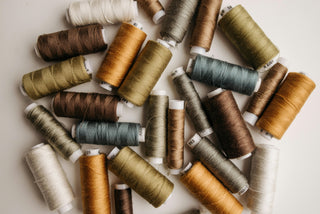What’s the Deal with Polyester? The Truth You Need to Know

Polyester is everywhere—your favorite leggings, workout gear, and even your underwear. It’s cheap, stretchy, and dries quickly, making it a go-to fabric for clothing brands. But here’s the problem: polyester is plastic, and wearing it is not as harmless as you might think.
If you care about your skin, health, and the planet, it’s time to take a closer look at what polyester is really doing.
What is Polyester, Really?
Polyester is a synthetic fabric made from petroleum-based plastic fibers. It’s essentially woven plastic that doesn’t break down like natural fabrics. While it may be lightweight and wrinkle-resistant, polyester comes with a long list of downsides—especially when it’s worn against your skin.

Why Polyester Might Not Be as “Comfortable” as You Think
Here’s the truth about polyester fabrics:
It Traps Sweat & Odors
Polyester doesn’t absorb moisture, meaning sweat sits on your skin, creating a perfect environment for bacteria (hello, body odor!). That “moisture-wicking” claim? It just spreads sweat around instead of actually absorbing it.
It Can Irritate Your Skin
Since polyester is made from plastic, it lacks the breathability of natural fabrics like cotton or hemp. This can lead to skin irritation, rashes, and even breakouts, especially for those with sensitive skin.
It’s Packed with Chemicals
Polyester is treated with harsh chemicals during production, including dyes, flame retardants, and formaldehyde. Some of these chemicals can be absorbed into your skin over time, causing irritation or long-term health concerns.
It Releases Microplastics Every Time You Wash It
Every wash sends thousands of tiny plastic fibers (microplastics) into the water system. These end up in oceans, marine life, and even our food—meaning polyester pollution comes full circle.
It’s Not Biodegradable
Unlike natural fabrics, polyester takes hundreds of years to break down. Every piece of polyester clothing you’ve ever owned is still sitting somewhere—either in a landfill or polluting our environment.
What’s the Alternative?
If polyester isn’t the best choice, what should you be wearing instead?
Hemp – Naturally breathable, antibacterial, and ultra-durable.
Organic Cotton – Soft, absorbent, and free from harmful chemicals.
Bamboo – Moisture-wicking, soft, and biodegradable.
Tencel (Lyocell) – Sustainable, silky, and gentle on the skin.
Final Thoughts: It’s Time to Rethink Polyester
Polyester may be everywhere, but that doesn’t mean it’s good for you or the planet. If you want breathable, long-lasting, and eco-friendly clothing, it’s time to ditch plastic-based fabrics and switch to sustainable alternatives.
Your skin (and the Earth) will thank you. 💚


